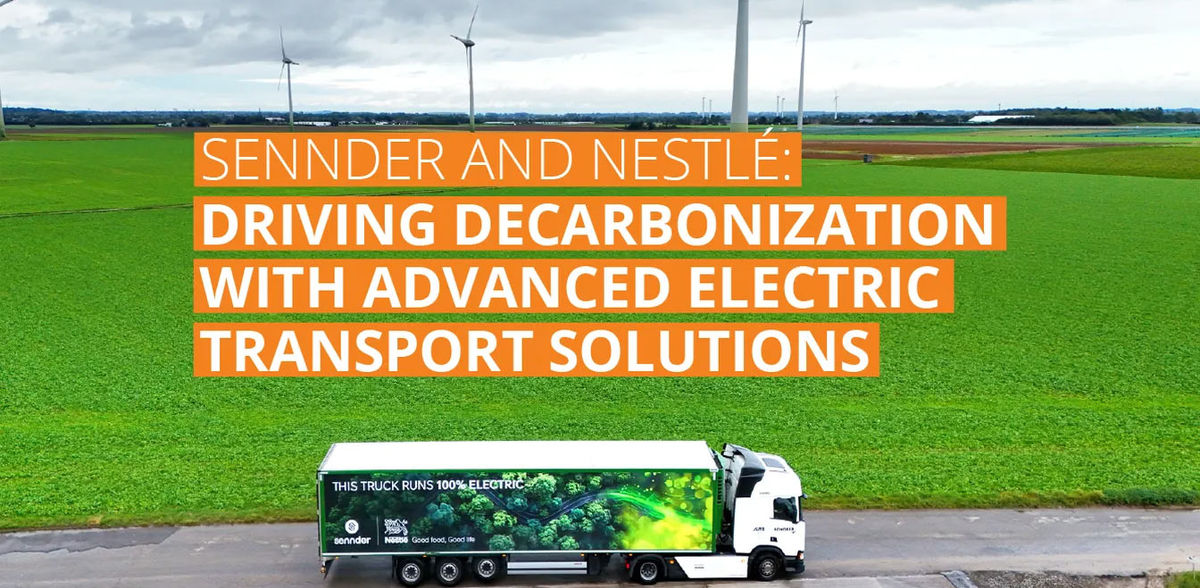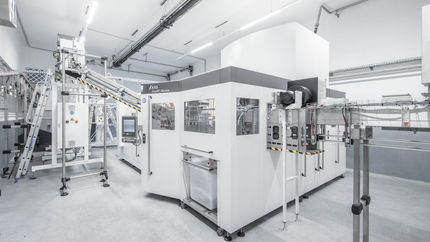Decarbonization of road logistics with the help of advanced electric transport solutions
Nestlé aims to achieve net zero emissions by 2050
Nestlé is taking a significant step towards net zero emissions by 2050 through its partnership with sennder, Europe's leading digital freight forwarder. With the help of sennder, Nestlé has been working to reduce emissions in its logistics network since 2021. As part of the collaboration, Nestlé has already saved more than 2,000 tons of CO2e and made over 3,000 greener transports with HVO100 and e-trucks.
The partnership with sennder is a key pillar in Nestlé's plan to decarbonize its logistics network in the long term - including maximizing transport efficiency, switching to advanced transport solutions and using renewable energy sources. Nestlé is also driving forward the achievement of its sustainability goals by investing in innovative infrastructure and operations.
An important milestone in the partnership with sennder was the introduction of electric trucks. Within four months, sennder delivered more than 100 orders with electric trucks for Nestlé's THOMY brand in North Rhine-Westphalia, covering a total distance of more than 10,000 kilometers electrically. On one route alone, Nestlé has reduced its CO2e emissions by around 55 tons per year.
Graham Major-Ex, Senior Director of Green Business & eMobility at sennder, says: "Nestlé and sennder have been working together since 2021 to deploy the two most viable green solutions for road freight transportation. Firstly, with HVO, a renewable diesel fuel that reduces CO2 emissions by up to 90 percent. The second is the use of electric trucks, which run entirely without exhaust fumes and reduce carbon emissions with every single transport. Road freight transport is currently undergoing a technological transformation - we see it as our responsibility to help our customers introduce electric trucks on a large scale and thus gain a competitive advantage for the future."
Matthias Fleischer, Vice President Supply Chain at Nestlé Germany, comments: "A high degree of optimization is also required in logistics to achieve our global goal of net zero emissions by 2050. Our partnership with sennder to introduce electric trucks was an important step in making our transportation both more efficient and more sustainable. We are constantly monitoring advances in infrastructure and battery technology. Already today, electric trucks can increasingly be used for short trips, such as shuttles from plants to distribution centers or for customer deliveries. With partners like sennder, Nestlé is integrating advanced transportation solutions to make long-distance transport electric in the future."
With the help of innovative strategies, sennder and Nestlé have jointly established a cost-efficient electric vehicle operation. sennder's extensive network optimizes the use of trucks and drivers. This is because the consolidation of loads ensures the greatest possible efficiency across all routes. Strategic charging stations have been placed near Nestlé sites for overnight depot charging to take advantage of lower energy costs during break times. In addition, loading and unloading schedules were precisely aligned with drivers' hours and e-truck charging times to maximize productivity and cost efficiency.
To further reduce emissions, Nestlé is also investing in solar-powered warehouses and charging stations equipped with photovoltaic systems and battery storage. This ensures energy efficiency with minimal environmental impact. The collaboration between sennder and Nestlé demonstrates a scalable and sustainable solution to further develop electric road freight transportation.
A key factor in the success of this partnership is the Juna joint venture established by sennder and Scania, which makes electric trucks available to carriers through a flexible pay-per-use model. The electric truck model used for Nestlé, which is leased from Schober Logistics via Juna, is highly scalable and adaptable. By eliminating acquisition costs and guaranteeing full utilization of available capacity, the sennder platform simplifies the transition to electric transport for carriers. At the same time, economic viability is guaranteed. This creates new opportunities for sustainable transportation solutions for shippers, including Nestlé.
The partnership between Nestlé and sennder demonstrates how companies can use advanced green technologies, data-driven solutions and collaborative approaches to drive the technological transformation of road logistics.
Note: This article has been translated using a computer system without human intervention. LUMITOS offers these automatic translations to present a wider range of current news. Since this article has been translated with automatic translation, it is possible that it contains errors in vocabulary, syntax or grammar. The original article in German can be found here.





























































